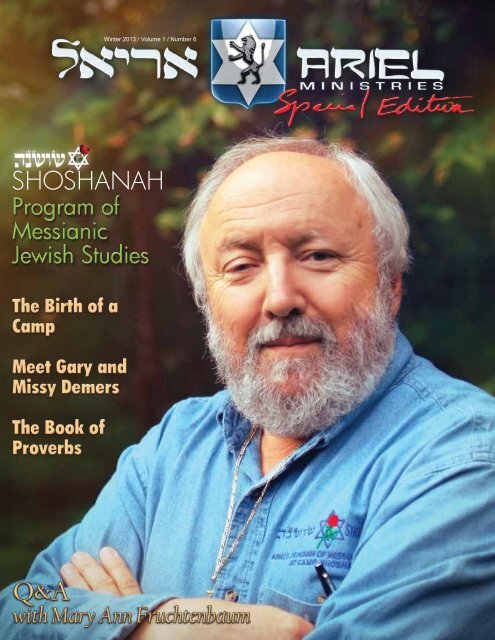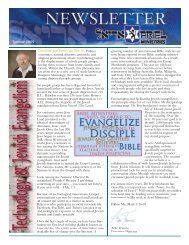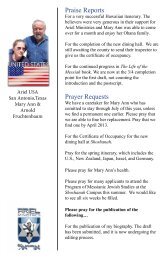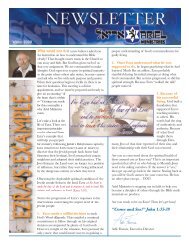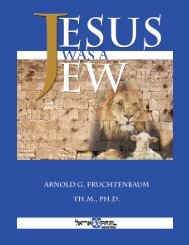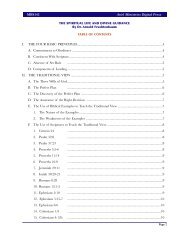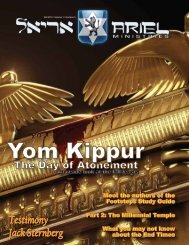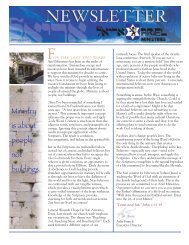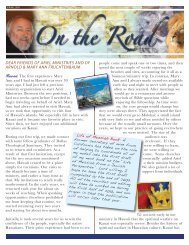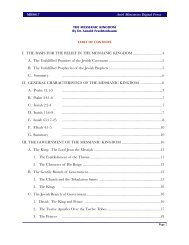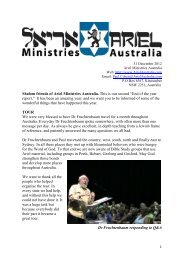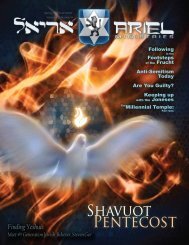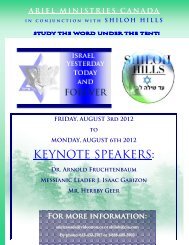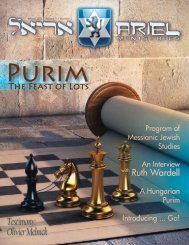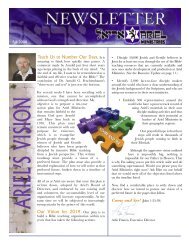Much More! - Ariel Ministries
Much More! - Ariel Ministries
Much More! - Ariel Ministries
- No tags were found...
Create successful ePaper yourself
Turn your PDF publications into a flip-book with our unique Google optimized e-Paper software.
Winter 2013 / Volume 1 / Number 6SHOSHANAH
from the desk of chris nikkelGreetings,I'd like to thank you for taking the time to check out the latest “special edition” issue of <strong>Ariel</strong>Magazine! This particular issue will focus on The Program of Messianic Jewish Studies atShoshanah – our summer discipleship program located in upstate New York in the AdirondackMountains.Inside you will find several stories, updates, resources, and ways to grow in appreciation andlove for the Jewish people. It is our desire at <strong>Ariel</strong> <strong>Ministries</strong> that your passion for Jesus wouldgrow as you read through this magazine. We also pray that your understanding from a Jewishperspective would take another step forward in discovery.I am very excited to let you know that there are several great projects that, by the time youread this, will be available.The first one is related to a book most of you are already familiar with, The Footsteps of theMessiah. The book isn’t the new news, but the e-Book version is! Now available for purchaseand download from the <strong>Ariel</strong> website is Footsteps for e-readers like iPads, Kindle’s, andNOOK’s.Next is an old book in a new language. Jesus was a Jew in Spanish is now available and we areexcited about the possibility of this great resource blessing the lives of Spanish speakers allover the world!The last item is a new paperback book called The Sabbath. This is one of Arnold’s Messianic BibleStudies that we decided to print. I am excited for you to check out these, as well as all the othergreat tools and resources from <strong>Ariel</strong>. Please visit our online bookstore at www.ariel.org.Our Home Office staff would love to invite you to pray for a couple of specific things. Pleaselift up all of our branches, and specifically our branch in Israel. They need our prayers nowmore than ever with the growing conflict that has occurred there. Also, please be praying forArnold and our field representatives as they teach all over the world in 2013. And last but notleast, please be praying for The Program of Messianic Jewish Studies at the Shoshanah Campusin New York. We are praying for another great summer of teaching and fellowship.I hope you enjoy this issue of <strong>Ariel</strong> Magazine!Chris NikkelAdministrator of Home Office Affairs02
cover storyThe Birth of a CampBy Arnold FruchtenbaumIn order for me to tell this story appropriately, Imust trace my steps back to 1956. It all startedwhen I came to faith through Ruth Wardell at theage of 13. My early discipleship of the milk of theWord of God came from her. Eventually, agentleman by the name of Burl Haynie came intothe picture, and he discipled me into the meat ofthe Word of God. It was these two individualswho laid the foundation in order for God to beginHis work in me – a work that would one dayinvolve a campsite.While working for what was then known as theAmerican Board of Missions to the Jews (formallyABMJ - now Chosen People <strong>Ministries</strong>), Hayniedeveloped a Bible memory program where aJewish believer would memorize 120 verses over a10-week period. As a reward, we were invited to acamp in Upstate New York where the focus of thestudies was on the verses we memorized. Theprogram continued for five summers. It was wellattended during the first summer of 1961 and lessso the subsequent years, but I continued to comeand was able to attend four of the five summers.The one year I could not attend, Haynie came outto California and taught classes, but theexperience was never the same as attendingsummer camp.Let me backtrack a bit. The actual story of CampShoshanah begins like this. Rose Burnham (all whoknew her called her Aunt Rose) was a missionaryto the Navajo. When her health broke, shereturned home to the Adirondack Mountains ofNew York. She worked for the Essex County TaxOffice. This put her in a position to acquire anenormous amount of land by merely paying thetax on the land. It was a time when lumber wasbig business. What the lumber companies didwas acquire the land for the down payment, cutoff all the trees they needed, and then not pay thetaxes on the property. As a result, the land wasconfiscated by the county and offered to thehighest bidder at a public market. Aunt Rose wasamong the first ones to see what was available,and by simply paying the tax due, she acquiredownership of the land before it was even put upfor bidding. Aunt Rose had acquired thousands ofacres of land! Then, she mapped out a section ofabout 350 acres and turned it into a camp. Rose03
cover storyeventually asked Mary Ann’s father, who was alocal pastor in the area, if he wanted to use theproperty for the children in the community whocould not afford to attend any other camp. Heagreed. It was called Camp Heathcote at the time,a name connected with Aunt Rose's mother.Rose’s studies of the Bible brought her to arealization of God's plan for the Jewish people,and she offered the property to ABMJ on thecondition that they develop the property into aBible teaching camp for Jewish people.Burl Haynie, at the time, was in charge of thecamp ministry for ABMJ and was sent up toinvestigate the property. At the same time, he waslooking for a site for the new memory camp. Uponhis first visit, he fell in love with the campproperty and agreed to use it for his memorycamp. The ABMJ did not accept the offer sincethey were not free to sell it. Still, Haynie wentahead and held five summers of memory camp.During the time ABMJ used the property for itspurposes, it was renamed Camp Sar Shalom. Afterthe four weeks, it would be called CampHeathcote again. And it was at that camp that Iwas discipled for four of the five summers. Whilethe program itself lasted for only two weeks, ayoung Jewish believer by the name of BobFutoran would accompany me to camp at leasttwo weeks before the program started and stay aweek or more afterwards. During the daytime, wewould work the grounds to get things ready, butevery evening was spent studying the Word withHaynie.After five summers, ABMJ ceased to sponsor thecamp program, but Haynie continued to use it athis own expense. I was no longer involved, due tomy own responsibilities; however, the camp wasalways cherished in my memories. Aunt Rose wasgetting older, and when she realized ABMJ wouldnot accept her offer, she had five pastors organizea ministry called The Clinton - Essex EvangelicalAssociation (CEEA) to continue running theproperty for the children and teen program in1966, and they did this for several years.Meanwhile, Aunt Rose moved to Florida, turningover her Adirondack home to camp property. Notlong after her move, Aunt Rose was promoted toHeaven. The CEEA continued to run the camp,but as they became more and more busy withtheir church ministry, the children and teenministry was eventually discontinued. The campitself was slowly running down.04
life applicationsalvation and the mature believer is the one whocontinues to receive the things of the Spirit.I remember as a young boy, I always looked up tomy older brothers. For this reason, I began to jointhem when they went to work out at the gym. Asconsistently as I went, I was soon able tobench-press about 135 pounds by the age of 14. Iwas so impressed with myself that I felt I nolonger needed to go to the gym because I hadreached my ultimate goal. Today, I am ashamed tosay that I still bench-press the same amount I didwhen I was 14. The reason for this is because Ibecame satisfied and stagnant in developing mymuscles. This is precisely what Paul is speakingabout in a spiritual sense. Even though weexperienced God’s salvation, the mature believerdoes not become stagnant but continues to receivethe wisdom of God to grow. As Charles Ryriestated, “spirituality is a grownup yet growingrelationship to the Holy Spirit,” (Balancing theChristian Life - p 13).The Natural ManIn verses 14-16, Paul immediately contrasts themature believer with the natural man who has aninability to receive God’s truth. The reason theunbeliever does not accept the things of God isbecause he is not able to understand them. Instead ofreceiving the truths of God, the Gospel isfoolishness to him. Since the natural man is notable to understand spiritual matters, it would beimpossible for him to understand the Spirit ofGod.I remember, after my first year of Bible college, Iwas taking a walk with a Jewish friend inMontreal. I geared our discussion towards theBible and began explaining the Gospel to him. Tomy surprise, he laughed and called the wholebelief “stupid.” I was shocked since this was thevery message, which encapsulated my heart andchanged my life. Paul’s statement rings true: thenatural man cannot understand the things of Godbecause he is not spiritually discerning.Somewhere in the MiddleFinally, Paul shifts his attention toward hisaudience in Corinth. In this third category, Paulfocuses on his listener’s spiritual state, tellingthem that they need to grow up! He begins bysaying, I, brethren, could not speak to you as to spiritualmen, but as to men of flesh, as to infants in Christ. (1Corinthians 3:1). Though he wanted to share thedeep truths of God, they were still acting asinfants in Christ. This is worse than a 23 year oldplaying in a bathtub full of toys. These are menand women who devalue the truths about Godand continue in their childish ways.Paul gives the reason for their immaturity in 1Corinthians 3:3, saying that they are acting fleshybecause of their jealousy and strife. Since therewas tension in their church, they weredeliberately rejecting the command to walk in theSpirit (Ephesians 5:2) and keep His unity(Ephesians 4:3). Instead of receiving the things ofGod, they were disregarding God’s commands byharboring sin. The result of holding on to sin isthat they were walking as mere men. Paul’ssolution: leave the childish things behind, andbegin receiving the things of God.ConclusionAs I desire to pursue further education, grow intoa better husband, and develop a deeper love forGod, I see more and more the absolute necessityto leaving childish things behind. This, of course,is not always convenient. While it would besimpler to become stagnant and satisfied with myfaith, I need to make sure I continue growing intothe man God wants me to be. In the same way,God wants all of us to become mature believers aswe continually receive the things of God. No longerharboring sins we enjoy, but leaving those thingsbehind and pressing on to the call of Messiah(Phil 3:13-14).07
York, then don’t send me anymorework.’ And the phones literallystopped ringing.”This was the cue that Gary and Missyhad been waiting for. At that point, theDemers knew they were being called towork at Camp. So they packed uptheir things and headed straight for theAdirondack Mountains.Praying for helpAlthough the Demers manage thecampground, such work could not beaccomplished without the assistance ofvolunteers and staff members. Theycurrently have a summer staff, butfinding additional help has proven achallenge over the years.“I hire high school kids to do thecleaning around the campsite,” saysGary. “We always have someone at thelake to watch over things. Right now,we are looking for someone who canassist us in administration work. Also,we need someone to shovel snow, helpbuild – essentially someone who is notafraid to get his or her hands dirty.”Missy chimes in, “Most importantly,we are looking for someone who wantsto be in ministry – someone with aservant’s heart.”Over the yearsThe Demers have witnessed, first-hand,the transformation of Camp over thelast 15 years. In the beginning, whatmay have seemed like an inexpensivesummer vacation, soon turned into asummer training program for seriousstudents.“It’s changed from a family reuniontype of atmosphere into more of aschool atmosphere,” says Missy. “It’sreally what Arnold wants it to be.”Aside from the atmosphere, thenumbers have changed too. WhenGary and Missy first signed on in 1996,the number of camp attendees wasaround 60 people. Those numbersslowly began to increase over theyears. In fact, five years ago theyreached a record-breaking 120attendees. Unfortunately, when theeconomy tanked, the numbersdropped back down to around 60;however, last summer they spikedback up to 100 attendees.“We’re excited to see the numbersclimbing back up there again,” saysGary. “I love to see people come in andstudy at this camp.”A heart for givingCurrently, there is a scholarship fundavailable for those who would like toattend the summer program, butcannot afford to. The fund is targetedmainly towards pastors andmissionaries, but it is available foranyone who wants to learn the Biblefrom a Jewish perspective. Last year,the Demers reported that theyreceived $7,000 in scholarship money.Some of that money was an answeredprayer for one pastor in China whowanted to attend Camp, but couldn’tmake financial ends meet.“We had a pastor come in from Chinawho attended on scholarship,” Missyexplains. “He needed flight money inorder to get here. I remembercontacting the home office and askingthem to pray. Soon after that call, theaccountant walked into the homeoffice with a check from a donor forthe exact amount that the man neededfor his travel. God has alwayshonored the scholarships for Camp.”To date, the scholarships have helpedsend 12 pastors to camp from allaround the world.Gary and Missy are both extremelypassionate about the scholarship fund.It is their prayer that many would giveso that others worldwide can beblessed with what is being taught inthe program.09spotlight“Camp is important,” says Gary.“Many people that come are notJewish, but they learn the Word from aJewish perspective. So I see peoplecoming year after year and I watchthem grow in the Word. I see campchanging lives.”Quiet observationWhile Gary and Missy observe theattendees every summer, the campattendees are quietly observing themfrom afar as well. Here’s what some ofthem had to say…Missy is amazing. She knows every camperwho ever came to Camp, greeting them witha ready smile and with words ofencouragement. She is a superbadministrator for camp operations,understanding that her position is not a job,but a placement of the Lord.Gary is very quiet, yet he sees everythingdown to the smallest detail. He is one of thesmartest people I have ever known, yetremains silent unless his opinion is solicited.We would not have a lunch hall if it weren’tfor Gary’s diligence. He is a gift from theLord.– Charles BargMissy and Gary are special people - kind,caring, and very funny. They always have ajoke for you to make you smile. Once wewent for a jog in the morning with Ivan andothers. He was ahead of us and heard a bignoise in the forest. Suddenly, we saw a bigbrown bear. Fortunately the bear ran in theopposite direction. Some days later, Missygave me a pair of earrings with a bear’s footon them, in honor of Ivan's meeting with abear.– Rita Nagy (<strong>Ariel</strong> Hungary)The dedication of Gary and Melissa Demersto God’s work through Camp Shoshanah isunparalleled. Their long hours and calmwisdom in the face of time pressures andoccasionally demanding guests point tonothing less than Holy Spirit indwelling. Ihonor their servant attitude.– Mottel Baleston
on the roadOn the Road inPOLAND AND HUNGARYBy Arnold FruchtenbaumIf you have read the latest book, When Your FaceWas Your Destiny, then you know Poland plays amajor role in the history of the Fruchtenbaumfamily. As a child, I lived in Poland for about ninemonths, but my memory only begins at a time inEurope, after we escaped from Poland throughthe Israeli Underground, which then was stillcalled the Palestinian Underground and theAliyah Dalet). From my parents and my family inIsrael, I heard many stories about Poland ingeneral, but more specifically of Pultusk, thePolish town where my family on my father's sidelived (my mother was from Russia). It was aplace I wanted to visit and my first planned tripwas back in 1967. I was finishing my studies inIsrael and was planning to fly home via Poland.But then came the Six-Day War. As a result,Russia and all her satellites, which includedPoland, broke diplomatic relations. All flightsbetween Israel and Warsaw were permanentlycancelled, and I was unable to make the trip.It took a few years until I was finally able to getinto Poland with a friend, Barry Leventhal. Butduring that time, the country was still undercommunism and appeared to be failingmiserably. My goal was to visit Pultusk andBarry's goal was to visit Auschwitz, since he hadrecently finished his doctoral dissertation on theTheological Implications of the Holocaust. We had noplans for ministering; however, a Polish womanwho served as an underground missionarysomehow knew that we were coming andtraveled with us in Warsaw and Pultusk. Sheasked us to speak in a small house group whilewe were there, and we obliged.After the fall of communism, I returned to Polandwith my Israeli cousin focusing on Pultusk andTreblinka - the extermination camp where mostof my relatives were murdered. The countryshowed a massive improvement fromcommunism, but the results of the redoppression was still clearly obvious. I met withbelievers around the table, although no ministryopened up at that time. Then about three yearsago, we received letters from Poland asking us tocome and speak. For the first time, several doorsin that country opened up. Jan Marek, a Polewho had immigrated to Germany and visitedCamp Shoshanah several times, helped to organizethings and drive me around. It was at that timethat we decided to do a one-month itinerary. Janagreed to organize the three weeks we wouldspend in Poland. We included an additionalweek in Hungary, since <strong>Ariel</strong> had just recentlyopened a branch in Budapest.10
on the roadI flew into Warsaw where Jan met with me, andtwo nights were spent there in order to help meget over the jet lag. Once I recovered, we drove tothe northern part of the country where I had aseries of meetings. Two things stood out. Therewas one person who had attended my meetingstwo years earlier, but he was a Jehovah's Witnesswith a strong denial of the triune nature of theGod of Israel. During the time in between, he hadread some of our <strong>Ariel</strong> literature that had beentranslated into Polish and was now a firmbeliever in the Trinity and Deity of the Messiah.There was another person who had attended myprevious meetings. This gentleman spoke withme about his family secret, regarding thepossibility of having Jewish origins. I suggestedthat he pursue his older relatives and ask them tobe honest about those origins whatever theresults might be. His Jewish origins wereeventually confirmed, and he began reading up onMessianic Jewish practice, as much as that ispossible in Poland. While there, we took a ride tothe very northern shores to Stutthof former NaziConcentration Camp), where two of my auntswere interned and from which they were forcedon the death march. Few survived that march,including my two aunts, one of which was themother of the two Israeli cousins who had joinedus.My cousins returned to Israel, while I flew toBudapest to meet up with Ivan and Rita Nagy,who head up the <strong>Ariel</strong> Hungary branch. I wasthere for only one week, but it was a very fullweek of teaching, visiting Jewish sites, and eatingin Jewish restaurants. The Jewish community inHungary is experiencing quite a comeback afterthe decimations of Nazi occupations. I hadspoken in Hungary only once before and it wasrather sporadic, but this was very well organized.I am looking forward to a longer itinerary inHungary sometime in the near future.Jan drove into Budapest and brought me back toPoland for another week of meetings in the southpart of Poland at a church I have been to before.The members showed great interest in my pastvisits, and they showed it again in the future. Itwas a pleasure just being there with the believers.After about a week or so, we drove to a hotel notfar from Pultusk and were joined by two of myIsraeli cousins. All of us went to Pultusk for theday. When the mayor found out that we werethere, he invited us over to his office where wechatted for over an hour. The fact that ourgrandfather was a key rabbi in Pultusk attracteda lot of attention. The next day, Jan and Ireturned to Pultusk for the day just so I couldwalk up and down all the streets of the town thatwere so important to the history of theFruchtenbaum family. My cousins spent the dayin Treblinka.11
Q & AIf someone could carve out a rich piece ofhistory and tell the story of Camp from itsinception, Mary Ann Fruchtenbaumwould be that person. She is the wife ofDr. Arnold Fruchtenbaum, a faithfulservant of Christ, a counselor to women,and a longtime supporter of Camp.Mary Ann’s fondest childhood memories were spent inupstate New York, amidst the Adirondack Mountains on apiece of property that has served a great purpose for morethan 50 years. I had the wonderful opportunity to sit downwith Mary Ann and discuss the history of Camp, and what ithas meant to her all of these years.EMILY GLISSON: You have a lot of history with Camp.How did it all begin?MARY ANN FRUCHTENBAUM: It all began with awoman we used to call Aunt Rose (Rose Burnham). Shepurchased as much land as she could around Trout Pond, andshe made sure that the property would be used for camp. Atthe time, she called it Camp Heathcote.EMILY: What type of camp was this?MARY ANN: She really had a burden for the local people,especially the Essex and Clinton City children, as well asthe Jewish people. So she wanted the camp to be used inorder to reach kids.EMILY: So from the very beginning, this was a campdirected towards Jewish ministry?MARY ANN: Absolutely. But back then the focus was onyouths.EMILY: How did you and your family become involvedwith Camp Heathcote?MARY ANN: My father was an evangelical pastor whoended up in Essex because his church in New Jersey didn’twant him to give invitations at the evening servicesanymore. So he decided to go somewhere where he couldbe a missionary and a pastor. He believed the gospel neededto go out into the whole world. Eventually, my fatheraccepted a pastorate at a community church in Essex. Myfather had a strong burden for youth and wanted to seeprograms that would reach kids. He eventually met AuntRose, and the two instantly hit it off. She had asked somany pastors to become involved in her children’s campand they all declined. My father was the first local pastorwho was willing to work with Camp Heathcote.12
Q & AEMILY: How long was your father working withCamp Heathcote?MARY ANN: He began working there during the early1950’s and stayed for several years after. He eventuallydied in 1962.EMILY: Did you stay in Essex after your father passedaway?MARY ANN: No, my family and I moved back to NewJersey. But Burle Haynie had contacted my mom to seeif she would be the cook at the camp the summer aftermy father’s death, and she agreed. My sisters and Iassisted my mom in the kitchen. We had so much fun.We did this for two summers in a row, when I was 16and 17.EMILY: I understand you knew Burle Haynie beforehis involvement with Camp Heathcote?MARY ANN: Yes. Burle worked for the ABMJ (nowChosen People <strong>Ministries</strong>) at the time and my fatherused to take me to his evening meetings when I wasgrowing up.EMILY: How did Burle become involved with theCamp?MARY ANN: When Burle visited the campgrounds, hewas looking for a place to hold his “Memory Camps”,which were special Bible teaching camps for Jewishchildren. Burle knew several things needed to be doneto upgrade the camp. So he ended up working on manythings around the campgrounds. Burle, Arnold, and oneof Arnold’s friends, Bob Futoran, built one of the docksthere. Arnold was a teenager back then. They all knewthat the campsite had a specific purpose – that it wasset aside for Jewish ministry.EMILY: Did you meet Arnold at Camp Heathcote?MARY ANN: I did. When I was 13-years old, I metArnold near a birch on a road going to the pond. Wepassed one another. That prompted him to write anessay about it. When I was 16 and working in thekitchen at camp, I was going through a very difficultstage in my life. I was angry with God. That summer, Inoticed that Arnold and his friend Bob had so much joyin their lives. So that made me jealous. I wanted whatthey had. I had been exposed to so much evangelical“don’ts” in Christian living, and here were two youngmen who were joyous and happy with God. So I turnedback to God and asked Him to give me that kind of joy.And He did.EMILY: Camp Heathcote was eventually changed toCamp Shoshanah. But now, it is officially called TheSchool of Messianic Jewish Studies at Shoshanah. Inyour opinion, how has Camp changed over the years?MARY ANN: I watched it go from Bible classes forkids to more intensive training – from the basics of theBible to the meat of God’s word. I watched the focusshift from children and teens to adults and families. I’veseen it go from teaching to discipleship andevangelizing. I’ve also watched the campers veryclosely, who in the beginning were always from nearbyEssex. Then it broadened to children, teens, and adultsin the area. Today, it is international. It has beenhumbling to watch.EMILY: But the one thing that hasn’t changed over theyears is its purpose for Jewish ministry?MARY ANN: Correct. This program has always beenfor Jewish and Gentile believers, teaching gentiles toshare the Bible from a Jewish perspective and to reachJewish friends in ministry. The prejudice of locals in thearea has been challenged again and again, but Burlecarried that vision for Jewish ministry, and we picked itup where he left off.EMILY: What has been your role with the Camp?MARY ANN: My involvement has always beencounseling women. Counseling is a gift I inherited frommy father. I recognized that this summer program wasset aside for more than just Bible study. It was also setaside for counseling and healing. My burden personallyis for people dealing with chronic illness and peopleand families dealing with mental illness. We all needhope. But whenever I counsel these women, I challengethem to walk the campgrounds and listen for God inHis creation.EMILY: Speaking of walking the campgrounds, Iunderstand you also had something to do with themusic and color at Camp?MARY ANN: I always like to say that life would“b-flat” without music and color. I used to sing beforeArnold would speak. To me, music is the ribbons andbows around the campgrounds. Gardening is veryimportant to me too. I took a bunch of small lilacs andplanted them along the roadway. My sister Bethplanted roses at the base of the entrance. My brotherhelped by watering and maintaining. I believe plantsteach and grow us. God uses that.13
Every summer for the past 39 years, <strong>Ariel</strong> <strong>Ministries</strong> haswelcomed students of all ages from many countries tojoin us for our Messianic discipleship program held atCamp Shoshanah. It is nestled in the beautiful AdirondackMountains of Upstate New York, and provides theperfect setting for our newly expanded six-weekprogram of rich Bible study, fellowship, and fun. Youcan attend from 1 to 6 weeks of the program, dependingon your schedule. Our program centers on thegrounding and growth of believers through in-depthstudy of the Scriptures from a Jewish perspective. Thetime of Bible study combined with worship, fellowship,and the beautiful surroundings, makes the Shoshanahcampus the perfect retreat for refreshment and renewalof your faith. If you have any questions, our camp staff isready to answer them. Please call (518) 834-6057 or logon to www.ariel.org for more information.
feature storyThe GreatestForm of Worshipby Christiane Jurik“It is the nearest thing to the Millennium,the most special and trustworthy placewith the best Bible teaching in theworld!” When Beth Fearnley from NewZealand spoke these words, we weresitting in the rustic dining hall of CampShoshanah, home of <strong>Ariel</strong> <strong>Ministries</strong>'Program of Messianic Jewish Studies.“I agree with Beth,” Angelica Rozewiczfrom NY chimed in. “Camp Shoshanah isheaven on earth.” The South Africaninvestment specialist Michael van Andelnodded.16
feature story“It is a privilege to sit under Dr. Fruchtenbaum'steaching and have the opportunity to ask all thosequestions which almost no one else would try toanswer!”Surrounded by the low mountain slopes of theAdirondacks, Camp Shoshanah has become a spiritualhome for many people from around the world. Drawnby the studies of Dr. Fruchtenbaum and his carefullychosen co-teachers, they spend the majority of theirprecious vacation time learning the Jewish roots oftheir faith in Jesus. The five hours worth of classes perday demand of them the greatest devotion to the Wordof God, and a ferocious hunger to learn unites thesepeople who otherwise might not ever have met.And then there is the influence of the Holy Spirit.Eagerness to delve into the Scriptures alone could notexplain the presence of E. G., pastor of an undergroundchurch in China. It was his first summer at Camp thisyear, but the words with which he described hisexperience already came from the depth of his heart.“Two years ago a man, who taught English at a localcollege, told me about <strong>Ariel</strong> <strong>Ministries</strong>. I startedstudying their materials. One morning during myprayer time, I read Psalm 81. The Lord encouraged meto contact Arnold and ask if I could possibly come toCamp in 2013. Missy Demers responded saying thatthere was a scholarship available for me and that Ishould fly in this very summer. It is amazing! I feel myeyes were opened.”Asked if he would be able to use what he had learnedat Camp, his eye started tearing up. “I am at animportant point in my life. God opened a door for meto train the next generation of pastors in China. I wantto pass on the Life of Messiah course to them!”In a certain way, the name under which Americans andinternationals alike have gotten to know and love thiscamp is a bit of a misnomer. Granted, theaccommodations in cabins that smell of freshly cutwood as well as the fact that bathroom breaks requirea bit of a hike through the forest make the experiencerustic. Some students therefore opt to spend the nightsin nearby motels. But it is the level of teaching thatsurpasses the name “Camp”. Author and president ofIsrael Today, Dr. Jeffrey Johnson, put it this way, “Tocall this school a camp is misleading insofar as thelevel of education one receives here does hold its ownif compared to seminaries like Moody Bible Instituteor Dallas Theological Seminary.”Dr. Johnson, Sam Nadler and Michael Gabizon all dida fabulous job teaching. The one to receive standingovations for his course on the Holocaust though wasArnold’s long-time friend and Teaching Elder of BethMessiah in Livingston, NJ, Mottel Baleston. Hestarted attending Camp in 1978. Twelve years later hereceived the opportunity to teach his first class. “Itaught a course on the Intertestamental Period,” heexplained. “My friends at Camp joked that the firstcourse Dr. Fruchtenbaum trusted me to teach was onthe ‘400 silent years’, figuring I couldn't do too muchdamage!”Obviously, he did so well that he was asked to comeback to the pulpit every summer since. His twohistorical courses this year catered just as much to themain goal of Camp as did Dr. Fruchtenbaum’sexpositions on Daniel and the Messianic JewishEpistles: to help Jewish and Gentile believersunderstand the Scriptures in their dealings with theJewish Messiah, and the proper approach to studyingthem is the factual, historical, archeological, anddispensational one.The students were so busy taking down notes duringclass that they could not possibly digest all theinformation fast enough to ask intelligent questions.It was Mottel Baleston who therefore, many yearsago, established “Stump the Fruit”, a special weeklyQ&A session during which the campers can ask anyand all questions they have about the Bible. It is notuncommon for these sessions to reach late into thenight, and so far no one has walked away dissatisfiedwith the answers they have received.Surprising to some, Dr. Fruchtenbaum and the otherteachers are very approachable even outside of class.Many a times, one can listen in on lively discussionsbetween teachers and students about difficultdoctrinal issues. These conversations take placeduring breakfast, lunch, and dinner, or on the porch of17
feature storythe beautiful Hall of Wisdom,commonly know as Lecture Hall.Tim Velasco, who attended Camp forthe first time in 2010, put it this way,“The Messianic studies at Campprovided the answer to my burningquestion of who on earth this Jesus ofthe Bible really was! UnderstandingYeshua, as I know him now, in his proper context, islike seeing clearly for the first time. So many of thethings I had dismissed about the Bible, particularly theNew Testament, as inconsequential or too deep, nowmade sense. He was and is a Jew, and to study himfrom this perspective is like traveling back in time andsitting at his feet; and what beautiful feet they are! Ifell deeply in love with this Jewish man.”Like so many others, Tim decided to return a yearlater. This time he brought his son. Michael andHannah Gabizon, who started leading the youthprogram three summers ago, took him under theirwings. The young couple had established a beautiful,parallel world in which children and teens learn thesame material as their parents but at their own pace.Supported by devoted volunteers, the Gabizonschallenge their students to go beyond the typicalSunday-School knowledge and expand their horizons.Many of these kids return to ‘the real world’ betterversed than the teachers in their churches.Realizing though that pure head knowledge does notchange lives, the Gabizons established what theycalled “Rec-Time”. During this morning class, the kidsget to play sports. They hike around Trout Pond Lakeor construct cardboard boats to race along the beach.It was Hannah who coined the name “Theme Night”to describe the last class of the day. While the childrenmemorize a verse, which they are to present duringthe weekly Shabbat dinner, fun games help them toapply it to their lives.Sasha G., <strong>Ariel</strong>’s representative in Israel, was anotherfather who brought his children to Camp this summer.While his son <strong>Ariel</strong> enjoyed roughhousing, paintballing, and, yes, studying, his daughter Liel, the mostbeautiful, Tinkerbelle-like, autistic girl one couldpossibly meet, experienced her own sense of wonder.“My daughter loves this place,” Sasha explained withobvious emotion in his voice. “She is flying here! Thepalpable love and peace of Camp Shoshanah give herthe opportunity to blossom.”This soft-spoken Israeli was not the only <strong>Ariel</strong>representative who attended Camp this summer. Ivanand Rita Nagy flew in from Hungary where theyestablished a branch in September of 2011. The Nagysused their 5-week stay at Camp to recharge theirbatteries and discuss business with Arnold. Askedhow attending Camp differed from the online coursesthe ministry offers, Ivan replied, “When someoneholds a lecture, he has to understand the material.You can ask him questions. The learning experiencetherefore differs greatly from a private study at homein front of the computer.” Pensively, he added, “Thehighest form of worship is the study of God's word.Like everyone else, we come to Camp to study. Wecome to worship God!”Worship takes on many forms in this place “wherethe devil is not,” as one of the kids put it. The worshipteam introduces each class with two, mostlyMessianic songs, and adults and youngsters alikeraise their voices to the Lord who brought them here.In the afternoons, Hannah Gabizon offers an hour ofMessianic dance while the less agile people move themountains during prayer time at the porch. And thenthere is the weekly “Extravaganza”, formerly knownas Talent Show. From jokes to anecdotes, slide showsand juggling tricks to heartfelt worship songs, theamount of presentations by the campers is onlysurpassed by the pictures Dr. Fruchtenbaum takesduring this special time at a Camp that has changed amultitude of lives.18
The Book of Proverbsby Jeffrey GuttermanThe following article is based on previous teachingat the Program of Messianic Jewish Studies“The Book of Proverbs is basically aboutdifferent kinds of people, what theybelieve and do, and how they interactwith one another. People createcircumstances that are good and bad,and you and I have to deal withpeople and circumstances as we gothrough life. Solomon’s aim in writingthis book is to help us become skillfulin relating to both people andcircumstances so that we can make asuccess out of life to the glory ofGod.”-Warren W. WiersbeThe main theme of the Book of Proverbsis found in a single word,“WISDOM.”The words “wisdom, wise or wisely”are used about 112 times in this Bookof the Bible.19
ible studyBackground:The Book of Proverbs is included in the OldTestament group of books known as the “WisdomLiterature.” The wisdom books in the Bible can beremembered most easily if we think of them assort of a stair step/pyramid picture. They are theBooks of:The History Of ProverbsDuring the ancient times of the Bible in theMiddle East, wisdom was seen in anyone whopossessed a skill -- whether that skill was a tradeor intellectual in nature. Wisdom was understoodto be a gift of the gods. Over time, wisdom wasmostly considered to be an intellectual skillmanifested in those that could perform magicand/or exorcisms (that is -- the casting out of evilspirits).Writings of wisdom literature similar in style toThe Book of Proverbs have been found in manycultures that lived in the area called the FertileCrescent. Some of these have been dated asexisting before the time of Solomon and evenbefore the Hebrew nation was formed. Almostevery king had advisers. These advisers wereexperienced politicians, military tacticians,diplomats, etc. When a king had an importantdecision to make, he would consult his wise menfor advice. This is seen in the Bible in manyplaces. Joseph (Gen 41:8, 38) was an adviser to thePharaoh of Egypt. Daniel (Daniel 1:19; 6:28) was anadviser to kings of Babylon and Persia. Thesebiblical examples demonstrate that theseadvisers held quite a bit of power in the affairs ofthe nations.There is much wisdom literature surviving fromthe geographical areas in and around Egypt,Canaan, and Mesopotamia. At the time that theHebrew nation came onto the world stage as aseparate nation in the Mosaic period,approximately 1500/1446 B.C., many nations andtribal groups had already developed their own“wisdom literature.” Scholars have been able tocompare and contrast the Hebrew wisdomliterature to literature from pagan cultures. KingSolomon was compared to other wise menthroughout the world and ranked at the top in1 Kings 4:29-34. Hebrew Wisdom Literature has noequal in the ancient world due to the fact thatThe Book of Proverbs is the only one that is divinelyinspired.Men, as well as women, were considered wise.In 2 Samuel 14:2, Joab, David’s general, enlisted theaid of a “wise” woman of Tekoa to convince KingDavid to bring Absalom back from exile. Wealso read of the wise woman of 2 Samuel 20:16 whodelivered the head of Sheba to prevent Joab fromkilling many people just to get to Sheba who hadbetrayed David.Throughout history, proverbs and other wisesayings have been collected and put intobooks, but no compilation is more significantthan The Book of Proverbs. The most significantaspect is that The Book of Proverbs is found in theBible which means that it is the infallible,inerrant Word of God, inspired by the Spirit ofGod as we see in 2 Timothy 3:16, All Scripture is20
inspired by God and profitable for teaching, forreproof, for correction, for training inrighteousness;This verse tells us that Scripture is inspired andthat it is profitable in four areas:1. for right teaching or doctrine;2. for reproof or rebuke—of actions thatare not right;3. for correction—to set one on theright path; and4. for training or instruction inrighteousness—how to keep on theright path once one is there.All four of these are accomplished by the Book ofProverbs. There are proverbs that rebuke peoplewho are telling lies, who are lazy, who get drunk,who commit sexual sins, and other personalfailures.The Book of Proverbs does not only point outhumanity’s weaknesses and failings. It also giveshonest and direct correction, and points us to theway of righteousness. Once one gets on the rightpath, this book helps one to stay there by being aconstant reference. The wisdom lessons containedherein are a part of God’s revelation and have beengiven to mankind to assist us in how to live thislife on earth.What is it about proverbial sayings that makethem so popular? In ancient times only kings,prophets, and priests possessed copies of theScriptures. The common person couldn’t afford tohave his or her own individual copy. Many peoplewould memorize Scripture so that they couldrecite it, teach it to their children, discuss it withothers and then meditate on the meaning of God’sWord (Deut. 6:1–9). Proverbs, as a writing style, isextremely efficient, packing a lot of informationinto a short saying of few words. For example:Proverbs 16:18 Pride goes before destruction, And ahaughty spirit before stumbling (NASB). This is apowerful message in a short saying.bible studyAuthorship:The opening of the Book of Proverbs reads:/mishlay shlomo/ which translates,“Proverbs of Solomon.” Scholars to Solomonhave attributed authorship for most of the Bookof Proverbs. Proverbs 25:1 states that Solomon isthe author of the Proverbs, but it was theassistants of Hezekiah that copied them down.Proverbs 25:1 These also are proverbs of Solomon whichthe men of Hezekiah, king of Judah, transcribed. Agur,the son of Jakeh, is identified as the author ofProverbs 30, and King Lemuel is the author ofProverbs 31. It is written of King Solomon, in 1Kings 4:32, “He also spoke 3,000 proverbs, and his songswere 1,005.”According to this verse, King Solomon spoke3,000 proverbs. Obviously they are not all here inthis book. 1 Kings 4:32 also states that Solomoncreated 1,005 songs, or Psalms. He most likelyinherited that musical skill from his father Davidwho wrote much of the Book of Psalms (73Psalms). We read in 1 Kings 4:30, Solomon’s wisdomsurpassed the wisdom of all the sons of the east and all thewisdom of Egypt. Solomon was the wisest of all ofthe men of the east and Egypt. Why is he thewisest man? The reason is found in God’s decreein 1 Kings 3:12, where God grants Solomon’srequest: Behold, I have done according to your words.Behold, I have given you a wise and discerning heart, sothat there has been no one like you before you, nor shallone like you arise after you. God is the source ofSolomon’s wisdom, thus making him not only thewisest man of his time, but also the wisest manwho ever lived or will ever live.Solomon, Agur, and Lemuel (some scholarsbelieve that Lemuel is another name forSolomon), were all inspired by God’s Spirit.Therefore, these are the Proverbs that God wantsto highlight to people. This does not mean thatother Proverbs do not contain good lessons butthese are the ones chosen by God.21
Arnold G.Fruchtenbaum,Th.M, Ph.D.Founder & Director<strong>Ariel</strong> <strong>Ministries</strong>San Antonio, TXRobert Morris, M.DivDirectorHaDavar Messianic<strong>Ministries</strong>Irvine, CAMichael GabizonSeminary Student<strong>Ariel</strong><strong>Ministries</strong>Dallas, TXJeffrey Gutterman, Ph.D.Field Representative<strong>Ariel</strong><strong>Ministries</strong>San Antonio, TXMottel BalestonAssociateMessianic RabbiBeth Messiah CongregationLivingston, NJ
SHOSHANAHEvery summer for the past39 years, <strong>Ariel</strong> <strong>Ministries</strong>has welcomed students of allages from many countries tojoin us for our Messianicdiscipleship program held atCamp Shoshanah. It isnestled in the beautifulAdirondack Mountains ofUpstate New York, andprovides the perfect settingfor our newly expandedsix-week program of richBible study, fellowship,and fun. You can attendfrom 1 to 6 weeks of theProgram depending onyour schedule. Ourprogram centers on thegrounding and growthof believers throughin-depth study of theScriptures from aJewish perspective.The time of Biblestudy combinedwith worship,fellowship, andthe beautifulsurroundings,makesShoshanahSchool theperfectretreat forrefreshmentandrenewalof yourfaith.Throughout the years, our MessianicJewish Studies Program has beengrowing. We now offer a two-weekprogram and have added a sixth weekprogram teaching various Bible topicsand courses from a Messianic JewishPerspective.You may attend for 1 to 6 weeks,depending on your schedule.Students are encouraged to attendall six weeks of the program if theirschedule allows.THE PROGRAMBREAKDOWNClasses begin on Monday morningand end on Friday evening. Duringthe first two weeks, the program willrun four hours per day. During theremaining four weeks, the programwill run five hours per day. Thestructure of the program will includefour classes, each an hour long per dayfor both two and three week programs.The three week program has a requiredfifth session for first-time attendees:The Survey of the Life of Messiah, whichruns for 75 minutes each day. The sixthweek program will also run for five hoursper day.A youth program is provided during theadult sessions. We have designed ourschedule for the maximum teaching timeduring the day, while allowing ample timefor fun and fellowship. The afternoons andweekends allow plenty of free time forworship, fellowship, hiking, and recreationat Trout Pond, as well as various otheractivities located nearby.Each Friday evening we have a specialShabbat service and dinner. Saturday is afree day for students who will continuetheir study and a departure day for thosewho are leaving. On Sunday mornings, wegather for a time of worship led by <strong>Ariel</strong>staff members and students. If you play amusical instrument, please bring it along toshare with us. Saturday and Sundayevenings are reserved for lakeside cookoutswith music, dance, and fellowship.CHILDREN AND YOUTH:(AGES 2-17)Serious Bible education is required for ouryouth. While opportunities for good funabound, first and foremost the Shoshanahfacility is a Discipleship Program. Duringadult classes, we will conduct Bibleteaching and recreation program forchildren ages 2-17. Topics will mirror theadult program topics. We are not able totake care of children under 2 years of age.You are welcome to bring your ownbabysitter or advise the camp to see if theycan hire a sitter for you.ACCOMMODATIONS:Accommodations include cabins formarried couples and families, separatedorms for single men and single women,and camp grounds (tent, camper, or RV).All accommodations are available on afirst-come, first-served basis, giving earlyregistrants preference regarding dates ofattendance. You may also commute fromone of the local motels (contact CampShoshanah for a list). Pets are NOTpermitted.MEALS AT FACILITY:Meals include breakfast, lunch and dinner.Please plan to arrive after 4 pm onSaturday, July 6. The first meal for newarrivals will be the evening cookout. PleaseNote: Attendees are not permitted toprepare their own meals nor is foodallowed in the cabins, nor use of thekitchen facilities for any purpose.MEDICATION STORAGE:A refrigerator is provided in the dining hallfor those attendees who have specialneeds, such as insulin storage, etc. Anymedicines that will be stored in therefrigerator in the Dining Hall designated“Student Fridge” MUST be put in acovered plastic box and CLEARLY labeled.
Week 4 – July 29 – August 2Week 1– July 8 – July 12Week 1 – The Book of ExodusDr. Arnold G. FruchtenbaumA study of the Exodus out of Egypt when the people of Israel became thenation of Israel. The study includes the history from the departure andarrival at Mount Sinai and the reception of the initial segments of theLaw of Moses and the building of the Tabernacle.The Book of LeviticusDr. Jeffrey GuttermanA survey that will cover the significance of the Mosaic sacrifices, thedietary code, the Feasts of Israel, aspects of the Law of Moses and theprophecy of Israel’s future, both fulfilled and unfulfilled.Week 2 – July 15 – July 19The Book of NumbersDr. Arnold G. FruchtenbaumA survey study through the Book of Numbers focusing on the history ofthe 40-years of wilderness wanderings and the significance of othersegments of the Law of Moses.The Book of Leviticus (continued)Dr. Jeffrey GuttermanWeek 3 – July 22-July 26Jewish Family LifeMottel BalestonHow a Messianic family lives that is distinctive from those of the WildOlive Branch persuasion.The Highlights of the Minor ProphetsDr. Arnold G. FruchtenbaumAll twelve minor prophets will be studied with some done in detail andsome as a survey. Special emphasis on Messianic prophecies of both thefirst and second coming of Messiah..Survey of the Life of the Messiah From a Jewish PerspectiveDr. Arnold G. FruchtenbaumBased on the book Harmony of the Gospels, this class walks you through thefour Gospels. It focuses on the events in the life of Messiah from aJewish perspective, shedding light on the Jewish theology and customsthat surround our Messiah.The Plan of the AgesMottel BalestonThroughout history God has dealt with Israel and the Nations indifferent ways, but always on the basis of His Covenant promises forthat dispensation of time. The sweep of Scripture becomes clear as thiskey to the Bible is understood.The Highlights of the Minor Prophets (continued)Dr. Arnold G. FruchtenbaumSurvey of the Life of Messiah (continued)Dr. Arnold FruchtenbaumThe Eight Covenants (continued)Dr. Arnold G. FruchtenbaumThe <strong>Ministries</strong> and Gifts of the Holy Spirit (continued)Bob MorrisWeek 5 – August 5 – August 9Plan of Ages (continued)Mottel BalestonThe Highlights of the Minor Prophets - (continued)Dr. Arnold G. FruchtenbaumSurvey of the Life of Messiah (continued)Dr. Arnold FruchtenbaumMessianic Jewish Theology TodayMichael GabizonThis course will cover special issues involved in Messianic Jewishtheology from a biblical and rabbinic perspective which include specifictopics such as circumcision, the Mosaic Law/Torah Obeservance,Messianic Congregations, Bar/Bat Mitzvah, Kashrut, among other.The Spiritual LifeMichael GabizonA study of the principles of the spiritual life and spiritual warfare,together with the role of the Holy Spirit, the new nature, the world, theflesh, and the devil.Week 6 – August 12 – August 16The Life of Messiah from a Jewish PerspectiveDr. Arnold G. FruchtenbaumBased on the book Harmony of the Gospels, this class is a study through allfour gospels. It focuses on the events in the life of the Messiah from aJewish perspective, shedding light on Jewish theology and customs thatsurround our Messiah. This is the complete course taught in one week.The Eight Covenants of the BibleDr. Arnold G. FruchtenbaumDetail study of the eight covenants of the Bible and how they relate toIsrael, the Gentiles, and the Body of the Messiah.The <strong>Ministries</strong> and Gifts of the Holy SpiritBob MorrisAn exposition of all passages dealing with this subject to show clearlywhat the Bible does or does not teach on the topic, and clarify what is oris not happening today
PART ONETHE PRINCIPLES OF PRAYERfruit of the fruchtI. THE DEFINITION OF PRAYERIn order to develop a definition of prayer, we will discuss thispoint in five areas.A. The Words UsedThere are several different Hebrew and Greek words usedconcerning prayer. We need to look at these one by one and try todifferentiate between them; this way we will have a better conceptof what prayer is about.1. The Hebrew WordsAltogether, there are three different Hebrew words.a. Tphilah and HitpalielThe first Hebrew word has two forms: tphilah, which is thenoun; and hitpaleil, which is the verb (I Kg. 8:23). This is aword that simply means, “to pray” in the verb form, or“prayer” in the noun form. The Hebrew root means, “tointervene,” “to interpose,” “to intercede.” Whenone intervenes between God and man, orinterposes between God and man, or intercedesbetween God and man, he is praying.b. Techinah and HitchaneinThe second Hebrew word also has two forms:techinah is the noun; hitchanein is the verbal form (I Kg.9:3). As a verb, it means, “to supplicate”; as a noun, itmeans, “supplication.” The Hebrew root means “to showfavor” or “to be gracious.” In its intense form, it means “to seek orto implore favor.” When we supplicate and try to obtain favor orobtain grace, we are praying.c. ChallahThe third Hebrew word is challah, which means, “to entreat thefavor of” (I Kg. 13:9). And when we entreat the favor of God, we arepraying.2. The Greek WordsThe Greek language has a total of seven different words that emphasizeprayer.a. Eschomai, Proseochamai and ProscucheiThe first Greek word has three different forms: eschomai, proseochamaiand proscuchei. This is the word that is used in the New Testament for25
fruit of the fruchtprayer to God in general. Literally, the wordmeans, “to ask for something.” When we ask Godfor something, we are praying. This is yourgeneral, common, everyday Greek word forpraying to God.b. Deomai and DesisisThe second Greek word has two forms: deomai or,desisis (I Thes. 3:10). This word carries the idea ofasking for something but with a more specificrequest.c. Aiteo and AiteimaThe third Greek word also has two forms: aiteoand aiteima (Jas. 1:5). This word means “to ask” or“to request.” When we ask something of God orrequest something of God, we are praying.d. Erotao and EroteisisThe fourth Greek word also has two forms: erotaoand eroteisis. This word also means “to request” or“to ask” for something. Again, when we requestsomething of God, or we ask something of God,we are praying.e. Eutugchano and UperentugcheoThe fifth Greek word also has two differentforms: eutugchano and uperentugcheo (Rom. 8:27 28).It means “to intercede” or “to petition.” When weintercede between God and man, when we makea petition of God, we are praying.f. Parakaleo and ParakaleisisThe sixth Greek word also has two forms:parakaleo and parakaleisis (II Cor. 12:8). This Greekword means “to comfort,” “to exhort,” “torequest,” “to entreat” or “to appeal”. And whenwe try to comfort, or exhort, or request, orentreat, or to appeal in a relationship to God, weare praying. This is the same used word for one ofthe names of the Holy Spirit: the Paraclete or theComforter.g. IketeiriaThe seventh Greek word is iketeiria, which means“supplication” or “request” (Heb. 5:7).B. The DefinitionFirst, by way of definition, prayer is humanspeech addressed to God. A second facet is thatprayer is asking something of God. Thirdly,prayer is conversing with God; we are carrying ona conversation with Him.From this definition, we can draw a cleardistinction between Bible study and prayer.When we study the Bible, God speaks to us. Butwhen we pray, we are speaking to God. This is asgood a definition as we can derive from the threeHebrew words and the seven Greek words.C. The Presuppositions of PrayerBased on these Hebrew and Greek usages andbased upon our definition, there are sevenpresuppositions we make when we pray.First, we presuppose that God is a personality sothat we can have an “I and You” relationship withHim.A second presupposition is the imminence ofGod. The imminence of God tells us that God isnear so He can hear our prayers.A third presupposition is the omnipresence ofGod. God is everywhere so when I am praying inAmerica and a believer is praying in Israel, Godcan hear both of us and see both of us.A fourth presupposition is the sovereignty ofGod. We really believe that He has control of HisCreation. He controls both persons and events;both persons and things. Because we believe He issovereign, we make these requests of God.Fifth, we also presuppose the omniscience ofGod; that He knows everything and knows howbest to answer our prayers.Sixth, we presuppose the omnipotence of God;that He is all-powerful.Seventh, we presuppose the promises of God;that He promised He would listen.D. The Nature of PrayerConcerning the nature of prayer, let me mentionsix things.First, prayer is an act. Prayer is not merely anattitude, though an attitude is involved; it is anact. Prayer should be an integral part of our lives(I Thes. 5:17). So each day the believer should beconversing with God because prayer is an act.Secondly, prayer is an act of position (Lk. 11:1 13).We have a position with God if we pray to Him.26
fruit of the fruitThirdly, prayer is an act of a specific petition.Fourthly, prayer is an act of an urgent petition.Fifth, prayer is an act of an emotional petition.Sixth, prayer is an act of a filial petition in thatwe have a father-son relationship.E. The Object of FaithFaith is the first foundation of our prayer life; wehave faith in God as God.II Timothy 1:12 states: I know whom I have believed.Psalm 18:31 teaches: who is a rock, besides our God.Psalm 46:1 declares: God is our refuge and strength.Habakkuk 3:18 affirms: I will rejoice in Jehovah. Theimplication is that God must be trustedregardless of how things come out. The believercannot demand that God answer his prayerexactly his way.II. THE SYMBOL OF PRAYERA. In the Old TestamentThe symbol of prayer is incense; the burning ofincense. In the Old Testament this is taught inPsalm 141:2:Let my prayer be set forth as incense before you;The lifting up of my hands as the evening sacrifice.One of the rituals in the Tabernacle was theburning of incense and it was to symbolize theprayers of the saints.B. In the New TestamentThis is picked up by the New Testament as well.Revelation 5:8 states:And when he had taken the book, the four living creaturesand the four and twenty elders fell down before the Lamb,having each one a harp, and golden bowls full of incense,which are the prayers of the saints.John wrote that in this vision he saw thetwenty-four elders each having golden bowls ofincense, which he interpreted to represent theprayers of the saints.Later, in Revelation 8:3 John wrote:And another angel came and stood over the altar, having agolden censer; and there was given unto him much incense,that he should add it unto the prayers of all the saints uponthe golden altar which was before the throne.This angel was given a bowl carrying much incenseand this is poured out onto the golden altar: thisrepresents the prayers of . . . the saints. The smoke ofthe incense was the prayer of the saints, whichwent up with God.Summary: From the fact that incense was thesymbol of prayer in the Book of Psalms andRevelation, two observations or conclusions canbe drawn. First, the purpose of the altar ofincense was to be a sweet-smelling savor to theLord. Secondly, this reveals how God views theprayers of the saints; they are a sweet-smellingsavor to the Lord.III. THE REASONS ANDPURPOSE FOR PRAYERAltogether, there are eight specific reasons andpurposes for prayer.A. Prayer Is a CommandFirst, prayer is not an option; for the believer,prayer is a command. In I Samuel 12:23 we aretaught that not praying for others is sin. If we arefailing to pray for others, for those that God hasburdened us with, we are sinning. We arecommanded to pray.In I Thessalonians 5:17, we are told to: pray withoutceasing and in Colossians 4:2, we are to: Continuesteadfastly in prayer.27
fruit of the fruchtB. Prayer Is Right and ProperSecondly, prayer is right and proper. This is thepoint of Luke 18:1:And he spoke a parable unto them to the end that they oughtalways to pray, and not to faint; . . .Yeshua (Jesus) told a parable to encourage peopleto continue praying because praying is both rightand proper.C. God Bestows Gifts and Blessings ThroughPrayerThirdly, prayer is a medium through which Godbestows His gifts and blessings (Dan. 9:3; Mat. 7:711; 21:22; Jas. 1:5).D. Prayer Is Essential to VictoryFourthly, prayer is essential to victory. This comesout rather clearly in Ephesians 6:10 18, the famouspassage on the spiritual warfare. He is primarilydealing with the pieces of the armor, which islargely the Word of God. Three times He tells usthat by means of this armor, we will be able toresist or stand against the Devil.But then after dealing with the various pieces ofthe armor in the spiritual warfare, he states inEphesians 6:18:. . . with all prayer and supplication praying at all seasons inthe Spirit, and watching thereunto in all perseverance andsupplication for all the saints, . . .The secret ingredient for victory in the spiritualwarfare is prayer; thus, prayer is essential tovictory.E. Prayer Is the Example of the MessiahA fifth reason for praying is to follow the exampleof the Messiah. He is our greatest example; He isthe one that we are to follow, and we are to followHim in prayer as well. Jesus prayed frequently(Mk. 1:35; Heb. 5:7).F. Prayer Is the Example of the Early ChurchA sixth reason for praying is to follow theexample of the early Church. The early Churchwas characterized by prayer (Acts 6:4; 12:5). Weneed to follow the examples of the early Church.G. Prayer Is a Channel of DeliveranceA seventh reason for praying is that prayer is achannel of deliverance; by means of prayer, God isdelivering us. We see this in eight different ways:first, we are delivered from temptation by meansof prayer (Mat. 26:41); second, we are deliveredfrom discouragement by prayer (Lk. 18:1); third,we are delivered from adverse circumstances byprayer (Acts 12:3 19); fourth, we are deliveredfrom ignorance or lack of wisdom by prayer (Col.1:9; Jas. 1:5); fifth, we are delivered from physicalsickness and death by means of prayer when Godso chooses (Acts 28:8; Jas. 5:13 17); sixth, we aredelivered from needs by means of prayer (Jas. 4:7);seventh, we are delivered from unbelievers bymeans of prayer (Rom. 15:30 33); and eighth, weare delivered from Satan by means of our prayer(Eph. 6:18).So, prayer is a channel of deliverance that weneed to consistently use. That is another reasonwhy we need to pray.H. Prayer Is the Channel for Spiritual MaturityThe eighth reason for praying is that prayer is alsothe channel for spiritual maturity; it is the meansby which God brings us to maturity. This is seenin five different ways: first, it is the means bywhich we fight the spiritual warfare (Eph. 6:1018); second, it is the means to spiritual growth(Eph. 1:15 23; 3:14 21; Col. 1:9 14); third, it is bymeans of prayer that we develop spiritualboldness (Acts 4:19 21; Eph. 6:18 19); fourth, bymeans of prayer we obtain the salvation of thelost (Rom. 10:1); and, fifth, by means of prayer wedo the work of world evangelism (Mat. 9:37 38).28
The Messiahin the Temple:The Symbolism andSignificance of the SecondTemple in Light of the NewTestamentby Roger LiebiThe Second Temple— the sanctuary atJerusalem during thetime of Jesus Christ— plays a verysignificant role in theNew Testament.Matthew toRevelation teemswith references tothis glorious edificeof Antiquity. Many readers of the Bibledo not understand much by the termssuch as “pinnacle of the Temple”, “theBeautiful Gate”, “Solomon’s Porch”, “theSheep Gate” and “the Sanhedrin”.These, and many other buildings of theTemple area, come alive in the presentpublication. They are connected toMessiah Jesus so that the life of faithmay be refreshed and enlarged by it.The Footstepsof the MessiahA Study of the Sequence ofProphetic EventseBookAvailable for the firsttime in eBook (i.e. foriPad, Kindle), thisclassic study canliterally be at yourfingertips whereveryou go. Using theBook of Revelation asan end time road map,Dr. Fruchtenbaumweaves the propheticwritings of the Hebrew Scriptures andMessiah's teachings to reveal God's planfor the future of Israel and the world. Witha wealth of wisdom drawn from his Jewishbackground and extensive research, theauthor even tackles the “problempassages” to provide a comprehensiveoverview of the entire range ofprophetic truth.eBook (download): $29Hardcover: $39The SabbathThis detailed study ofthe Sabbath comes ata time when there isso much confusionand debate amongboth Jewish andGentile believersregarding what theBible really teachesabout it. Theapologetics used formandatory Sabbath-keeping are almostexclusively based upon the OldTestament for obvious reasons: there isno New Testament command forbelievers in general or Jewish believers inparticular to keep the Sabbath. Thepurpose of this study, then, will be toexamine what the Sabbath is in bothtestaments. At the same time, it willexamine arguments used to supportmandatory Sabbath-keeping. This studyexamines the Sabbath in Judaism, theOld and New Testaments, the issue ofSunday worship and the Sabbath, theSabbatical Year, and the Year of Jubilee.Paperback: 117 pagesDimensions: 5.5" x 8.5"ISBN: 978-1-935174-21-9Softcover $13Now available in eBook $9Hardcover: 655 pagesISBN: 978-3-943175-05-9$44.95 Jesús Era Un Judío(book and ebook [epub/mobi])Messiah in thePassoverDemonstrationDon't let Eastercome and gowithout notice. Nowthis timely teachingby Dr.Fruchtenbaum isfreshly available fordownload on MP3.By leading thelistener through thesymbolism of aPassover meal, Dr. ArnoldFruchtenbaum examines what isarguably the most important feast in theentire Jewish religious calendar, theJewish Passover.51 minutes on MP3$3 for download$5 on CD while supplies lastWho was Jesus ofNazareth?Controversy over theanswer still ragestoday. Was Jesussimply a goodteacher? Was he awell-meaning butconfused religiousreformer? Was he adisciple of anotherteacher? Regardless of your opinion, oneoverlooked fact is key: Jesus was a Jew.Looking for answers as to the real identityof Jesus, Arnold Fruchtenbaum, author ofJesus Was A Jew, embarked on his ownpersonal search. Now this classic workhas been translated into Spanish and isavailable in soft cover book form, oreBook, usable for tablets andsmartphones.Spanish translation by: Esther SarfattiPaperback: 113 pagesDimensions: 5" x 8"ISBN: 978-1-935174-24-0Softcover $13Now available in eBook $9
ARIEL MINISTRIES11926 Radium StreetSan Antonio, Texas 78216-2713Phone: 210-344-7707NON-PROFITORGANIZATIONU.S. POSTAGEPAIDSan Antonio, TXPERMIT NO. 802Fax: 210-344-1114P.O. Box 792507San Antonio, Texas 78279-2507Email: homeoffice@ariel.orgwww.ariel.orgECFAAnInvestment That PaysEternal Dividends.Why not sponsor a friend, pastor, or missionary? Youcan donate to the camp scholarship fund and helpthose unable to come be with us.Contact the camp office today at (518) 834-6057.


